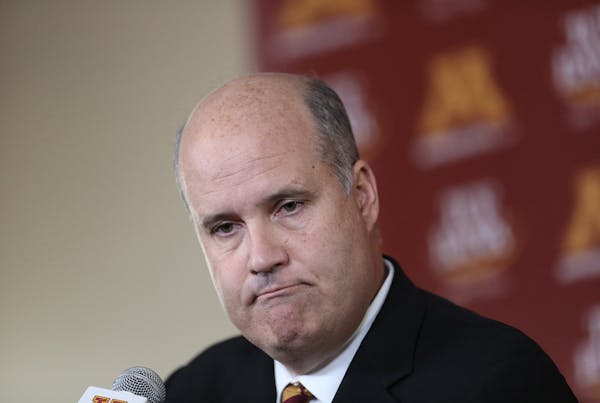The path to fund the University of Minnesota's ambitious $190 million athletic facilities upgrade will be markedly different — and likely more difficult — than the campaign that raised money for the school's new football stadium.
Some of the school's biggest contributors conceded Thursday that the campaign could prove difficult, with one calling it a "huge bite.''
One day after introducing the plan, school officials reiterated that state money, which provided the bulk of the funding for the $288 million TCF Bank Stadium, has been ruled out for the proposed series of athletic upgrades. Meanwhile, a key legislator flatly said no one should count on state money for the U's menu of upgrades.
University leaders said they would have to raise the money while explaining to donors that most of the fruits of their giving — the new sports practice facilities, weight rooms and athletic classrooms — would rarely be seen by the public.
Fundraisers and school officials, however, remained optimistic, and hinted that corporate contributions — and even naming rights for practice facilities — might be possibilities for enticing support.
"I think that's very wise," said Sen. Terri Bonoff, DFL-Minnetonka, who chairs the Senate Higher Education Committee. She said finding state money for the project would be "very difficult, [and] I don't support" doing so.
Athletic director Norwood Teague outlined the long-awaited proposal to the University Board of Regents on Wednesday. Contributor Curtis Sampson is supportive, but cautious.
"I would support it as much as I did for football and baseball. But it sounds to me like they're biting off a huge bite here," said Sampson, who the school identified as having given at least $50,000 to the university over a one-year period.
A spokesman for Gov. Mark Dayton said Thursday that the governor and Teague had discussed the school's athletic facilities needs during a luncheon in May, and that Teague had indicated to Dayton that the goal would be to raise the money privately. The governor, according to spokesman Bob Hume, told Teague that "I stand ready" to help raise private funds.
University Board of Regents member Dean Johnson, a former Senate majority leader, brought up another factor: Raising private money will be easier if the school's teams — particularly football, men's hockey and men's basketball — win more games. "When you have success, it's easier to raise funds," he said. "We point to Wisconsin and Northwestern. When they [went to] the Rose Bowl — I don't have the figures — but I know that their fundraising efforts certainly increased."
Some of the school's biggest fundraisers agreed that the task will be daunting. John Lindahl was co-chair, along with his wife, Nancy, in the school's push to raise $90 million privately for TCF Bank Stadium. He said he supports Teague's proposal, but raising the money would be challenging.
"I think it's a good plan. And I think the best thing is that [University President] Eric Kaler is supportive," said Lindahl, a founding partner of Northwest Equity Partners in Minneapolis, before adding later: "But that's a lot of money. We had to lead an effort to raise $90 million from the outside for [the football stadium]. …
"This project is different. It's broader. It goes to multiple sports. My gut would tell me that there are going to be certain people, or certain companies [who] will be more interested in specific sports. I think that will, to some degree, focus" the contributions.
Board of Regents chairman Richard Beeson acknowledged fundraising might be more difficult — or at least different — than it was for TCF Bank Stadium. "It's not a stadium. It's a series of practice facilities," he said. "It's a different project. It's a different economy. … [but] good projects always find money."
State Sen. David Thompson, R-Lakeville, an outspoken critic of increased government spending and now a candidate for governor, said that if the school can fund the project entirely with private money, "more power to them." But Thompson said the project ignored the overall question of the increasing role, and cost, of athletics at colleges across the country.
The more important discussion, he said, is "whether we should be needing nearly $200 million for athletics."
Mike Kaszuba • 651-925-5045
Kent Youngblood • 612-673-4365
